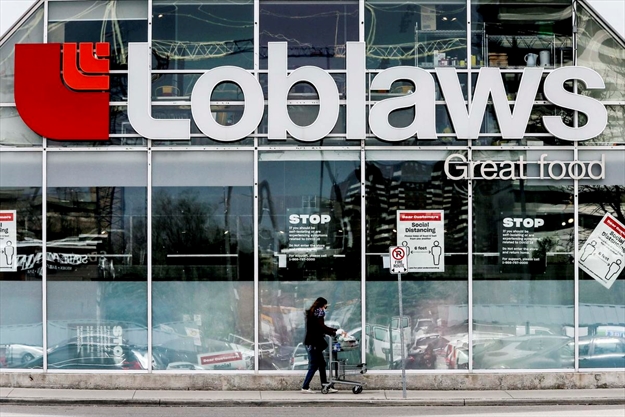Workers rights advocates and unions blasted Loblaw Cos. after the country’s biggest grocery chain raised its dividend Thursday but continued to resist reinstating “hero pay” for its employees.
Loblaw boosted its quarterly dividend to 33.5 cents per share, from 31.5 cents, after announcing third quarter earnings jumped to $342 million, up from $331 million in the same period last year.
A senior official with the Unifor union — which represents roughly 7,000 Loblaw workers across the country — didn’t mince words.

“It’s despicable,” said Chris MacDonald, grocery sector assistant to Unifor president Jerry Dias. “We have workers going in every day and risking their health at a time when the COVID numbers are higher than ever.”
“It’s absolutely appalling, and is a slap in the face of every single essential worker in the country,” added Deena Ladd, executive director of the Workers Action Centre, an advocacy group in Toronto.
The president of United Food and Commercial Workers Local 1006 A, which represents 25,000 Loblaw workers in Ontario, said the decision to boost the dividend showed a clear double standard.
“Once again we are disappointed that Loblaw has prioritized wealthy shareholders over our members who continue to work hard on the front-line during this pandemic,” said 1006A president Wayne Hanley.
“UFCW continues to call on Loblaw to do the right thing and recognize the contribution grocery workers make, and reinstate the pandemic pay permanently,” Hanley added.
A Loblaw spokesperson said the dividend increase is justified.
“After making the conscious decision to delay any dividend increase through the early part of the pandemic, Loblaw is now returning to its normal business practice. The company remains absolutely committed to its investments in colleague and customer well-being. Any suggestion of profiteering is untrue and ignores the facts,” said Thomas.
In the second quarter, Loblaw had a profit of $169 million, down from $286 million the previous year. At the time, the company said increased spending on protecting the health and safety of its customers was to blame for the decline.
Thomas also defended the company’s decision to end the $2 an hour COVID premium in mid-June after introducing it in March.
“The temporary pay premium, introduced at the height of the panic buying and uncertainty, was never about safety. It was a recognition of extraordinary effort,” said Thomas. “Our stores are now operating at a normal pace, albeit in a new way.”
The company — and executive chairman Galen G. Weston — can still afford to pay the premium, Ladd said.
“Galen Weston is one of the richest people in Canada,” said Ladd.
Unifor’s MacDonald agreed, pointing to an estimate by Forbes Magazine that the Weston family’s net worth has risen to $8.6 billion (U.S.), up from $7 billion (U.S.) in mid-March. Both net worth figures are disputed by the company.
Loblaw announced the $2 per hour COVID premium in March, then along with other major grocery companies, took it away in mid-June.
At the time it was introduced, Weston praised the performance of front-line grocery workers.
“Our supermarkets and pharmacies are performing well,” Weston said in a company statement. “The leaders in our business wanted to make sure that a significant portion of that benefit would go straight into the pockets of the incredible people on the front line.”
Speaking from Cornerbrook, Nfld., where 1,400 Loblaw workers have been on strike for the past 12 weeks, Macdonald said the union has repeatedly asked the company to reinstate the $2 per hour COVID premium that it took away in mid-June.
“We keep asking, and they keep saying no. They had hundreds of millions of dollars in profits this quarter, and they raised their dividends,” MacDonald said.
Josh Rubin is a Toronto-based business reporter. Follow him on Twitter:
